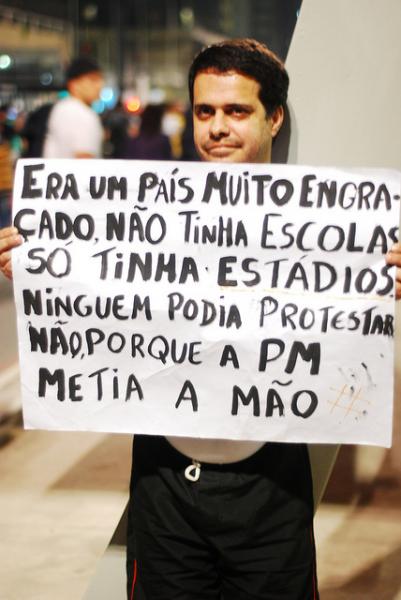Keeping Score: Rioting For More Than Football

Riots exploded all over Brazil last summer because of unfair public transportation fares, but have now developed into manifestations for better education, healthcare, transportation and safety, and - to many fans' surprise - against the World Cup.
The first riot occurred in early June of last year in São Paulo, when a group of people protested against the increase of bus fares and entered into conflict with the police, encouraging people in other cities to take action as well. In a matter of days, the riots encompassed a myriad of current Brazilian issues, from poor public education to massive governmental corruption, even leading protesters to invade Congress.
This year, although less frequent, protests such as these are still taking place and many participants promise they will stop the World Cup from happening – and if not, they will protest during it.
Foreigners planning on attending the World Cup may be wondering, among other things, why Brazilians are suddenly turning against their favorite sport’s event, and how safe and reliable Brazil will be as a host.
The World Cup has been the last straw for Brazilians, who have decided to finally express indignation en masse at the government’s corruption. Brazil is in no shape to host the World Cup when people are dying at hospitals with scarce resources, when public schools barely qualify as educational institutions and when safety is so poor that people fear exiting a bank in the afternoon.
Now, Brazilians hear the fantastic news that the government will be spending billions of dollars on stadium and airport construction for the Cup, even though President Rousseff had previously claimed that the government would not be the one financing these investments.
So it’s not that Brazilians no longer want to celebrate soccer, but that they’ve woken up to the fact that the government will not improve its practices and concern for the people unless the population stands up and proves that they are no longer standing by and accepting bread-and-circuses distractions.
Granted, many Brazilians are satisfied with the upcoming World Cup and do not find much need to protest current living conditions. Despite recent middle class growth, the gap between the rich and the poor in Brazil is still as wide as the Grand Canyon, and the rich will likely be the ones attending most of the games this summer.
But safety is the issue that bonds the rich and the poor. No one is safe: the poor live among many of the criminals, and the rich have difficulties escaping robbery, even with their bulletproof cars and high-security homes. Safety is also a key concern for foreigners who plan on visiting Brazil this summer.
Violence has recently increased because of the protests and widespread indignation. Protesters are vulnerable to extreme violence from the police, and journalists aren’t safe from aggression either. Brazil is the 10th most dangerous country for journalists, falling behind only Mexico and Colombia in the Americas.
Many protesters try to engage peacefully with the police but often face violence anyway. And Brazilians cannot but reflect on the irony of the situation: the police are widely known as never being on time to arrest a robber or kidnapper, but once government authorities demand their service, policemen become as abundant as sunshine in Brazil. The population has become so intolerant of police inefficiency and rampant crime that a handful of citizens began to publicly punish muggers and take the law into their own hands.
Most certainly, the police will be on guard to protect incoming tourists, but visiters should nevertheless be aware of the general risks in Brazil, such as thieves, dangerous areas like favelas and dishonest workers who will rip tourists off at every attraction site, taxi ride and restaurant. Americans, especially those who are used to living in a suburb where they park cars on the street and sleep feeling certain that the cars will still be there upon waking up, may be shocked at Brazil’s reality.
In Brazil, many prefer to live in apartments for safety’s sake. If they live in a house, it is either within a condo or four walls equipped with security systems. People don’t tend to walk around using their iPhones to avoid being robbed, and neither do they wear jewelry while out on the streets. If a robber approaches, they know the best option is to consent and not to fight back so as to avoid being killed. Drivers avoid waiting at stoplights at night for fear they will be robbed.
Attending the World Cup is a personal decision regardless of Brazilians’ attempts to boycott the event. The country is in turmoil but it does not cease to be beautiful, full of people with great hospitality and delicious food. Brazilians are dissatisfied with the government, not with foreigners.
Foreigners who will visit Brazil in the summer must make sure to be in the safest areas with the safest modes of transportation. Although staying at a good hotel in a nice neighborhood will be more costly, it is definitely worth it to not risk one’s life by finding housing in favelas. Cabs are safer than buses late at night and walking down a street at night alone should not be considered a viable option.
But if tourists find themselves somewhere Brazilians are protesting, while they should be mindful to protect themselves from violent interactions, they should also be sure to pay attention to the great lengths to which Brazilians are going to change their country, because foreign witness is what they rely upon to reveal Brazil’s other side to the world.
You've heard a lot of speculation about how this summer's World Cup will go for the world's soccer teams, but what about the people hosting the world-famous event? What's in store for the people and government of Brazil? Read Neon Tommy's new series "Keeping Score" to find out.
Reach Columnist Georgia Soares here; follow her on Twitter here.



